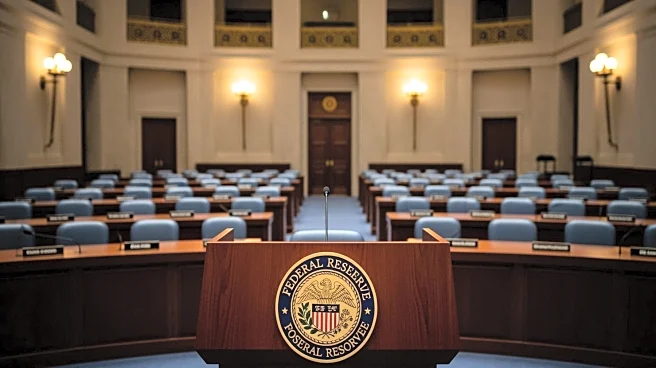What's Happening?
Federal Reserve Chair Jerome Powell delivered a speech at the National Association for Business Economics, focusing on the Federal Reserve's balance sheet and its role during the pandemic. Powell highlighted the balance sheet's importance in providing
monetary stability and supporting the financial system. He detailed the Fed's actions during the COVID-19 crisis, including emergency liquidity facilities and large-scale purchases of securities to stabilize the Treasury market. Powell also discussed the Fed's ample reserves framework, which has proven effective in controlling policy rates and supporting economic stability. He acknowledged the challenges faced during the pandemic and the lessons learned in managing the balance sheet.
Why It's Important?
Powell's speech underscores the critical role of the Federal Reserve in maintaining economic stability during crises. The Fed's actions during the pandemic helped prevent a severe economic downturn by ensuring liquidity and stabilizing financial markets. The discussion on the balance sheet and monetary policy provides insights into the Fed's strategies for managing economic challenges and supporting recovery. The speech also highlights the importance of clear communication and adaptability in monetary policy, which can influence market expectations and economic conditions. Stakeholders, including businesses and policymakers, can gain a better understanding of the Fed's approach to economic management and its impact on the broader economy.
What's Next?
Powell indicated that the Fed might approach the point of stopping balance sheet runoff in the coming months, closely monitoring liquidity conditions. The Fed plans to maintain ample reserves to ensure effective interest rate control and financial stability. The composition of the securities portfolio will be a topic of discussion, with a gradual transition to a desired composition to minimize market disruption. The Fed aims to maintain a portfolio primarily consisting of Treasury securities over the long run. Powell emphasized the importance of adapting monetary policy based on evolving economic conditions and risks, rather than following a predetermined path.
Beyond the Headlines
The speech highlights the ethical and operational challenges faced by the Federal Reserve in balancing monetary policy objectives with financial stability. The Fed's ability to pay interest on reserves is crucial for maintaining rate control and supporting economic goals. Eliminating this ability could lead to significant market disruptions and increased borrowing costs. The discussion also touches on the broader implications of the Fed's actions on the housing market and inflation, reflecting the complex interplay between monetary policy and economic conditions.

















